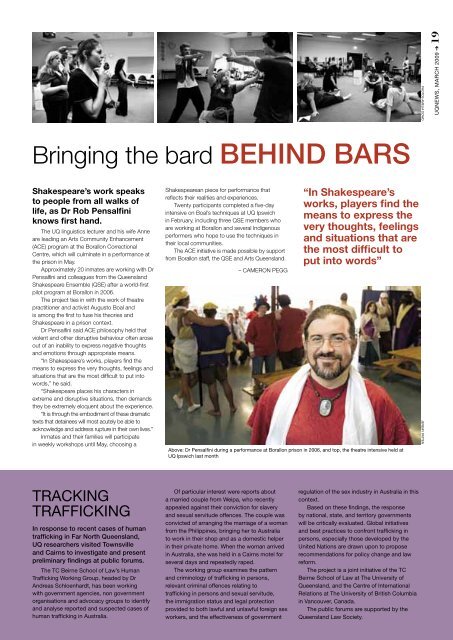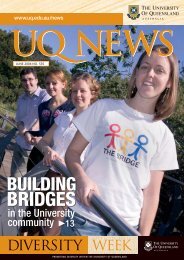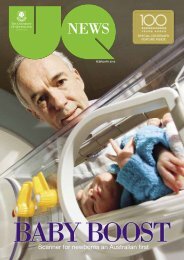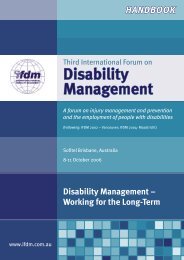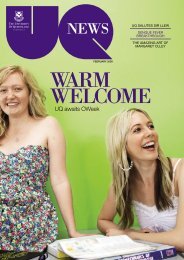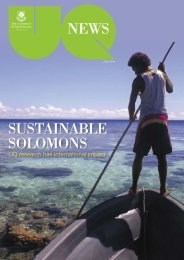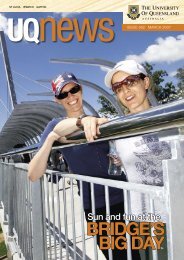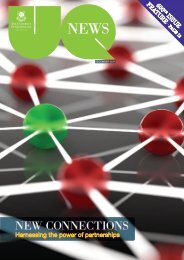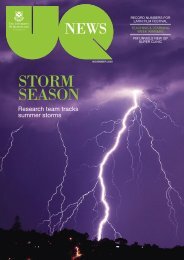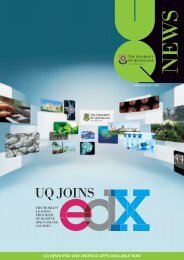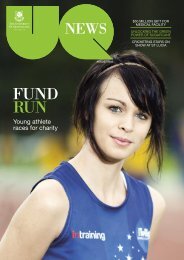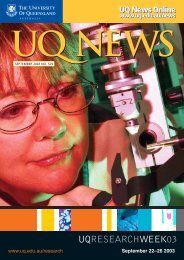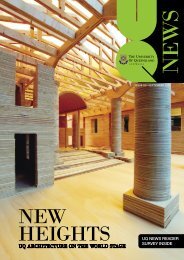Issue 581 (March 2009) - Office of Marketing and Communications
Issue 581 (March 2009) - Office of Marketing and Communications
Issue 581 (March 2009) - Office of Marketing and Communications
- No tags were found...
Create successful ePaper yourself
Turn your PDF publications into a flip-book with our unique Google optimized e-Paper software.
Bringing the bard BEHIND BARSShakespeare’s work speaksto people from all walks <strong>of</strong>life, as Dr Rob Pensalfiniknows first h<strong>and</strong>.The UQ linguistics lecturer <strong>and</strong> his wife Anneare leading an Arts Community Enhancement(ACE) program at the Borallon CorrectionalCentre, which will culminate in a performance atthe prison in May.Approximately 20 inmates are working with DrPensalfini <strong>and</strong> colleagues from the Queensl<strong>and</strong>Shakespeare Ensemble (QSE) after a world-firstpilot program at Borallon in 2006.The project ties in with the work <strong>of</strong> theatrepractitioner <strong>and</strong> activist Augusto Boal <strong>and</strong>is among the first to fuse his theories <strong>and</strong>Shakespeare in a prison context.Dr Pensalfini said ACE philosophy held thatviolent <strong>and</strong> other disruptive behaviour <strong>of</strong>ten aroseout <strong>of</strong> an inability to express negative thoughts<strong>and</strong> emotions through appropriate means.“In Shakespeare’s works, players find themeans to express the very thoughts, feelings <strong>and</strong>situations that are the most difficult to put intowords,” he said.“Shakespeare places his characters inextreme <strong>and</strong> disruptive situations, then dem<strong>and</strong>sthey be extremely eloquent about the experience.“It is through the embodiment <strong>of</strong> these dramatictexts that detainees will most acutely be able toacknowledge <strong>and</strong> address rupture in their own lives.”Inmates <strong>and</strong> their families will participatein weekly workshops until May, choosing aShakespearean piece for performance thatreflects their realities <strong>and</strong> experiences.Twenty participants completed a five-dayintensive on Boal’s techniques at UQ Ipswichin February, including three QSE members whoare working at Borallon <strong>and</strong> several Indigenousperformers who hope to use the techniques intheir local communities.The ACE initiative is made possible by supportfrom Borallon staff, the QSE <strong>and</strong> Arts Queensl<strong>and</strong>.– CAMERON PEGG“In Shakespeare’sworks, players find themeans to express thevery thoughts, feelings<strong>and</strong> situations that arethe most difficult toput into words”Above: Dr Pensalfini during a performance at Borallon prison in 2006, <strong>and</strong> top, the theatre intensive held atUQ Ipswich last monthPHOTOS AMELIA DOWD JEREMY PATTENUQNEWS, MARCH <strong>2009</strong> ➔ 19TRACKINGTRAFFICKINGIn response to recent cases <strong>of</strong> humantrafficking in Far North Queensl<strong>and</strong>,UQ researchers visited Townsville<strong>and</strong> Cairns to investigate <strong>and</strong> presentpreliminary findings at public forums.The TC Beirne School <strong>of</strong> Law’s HumanTrafficking Working Group, headed by DrAndreas Schloenhardt, has been workingwith government agencies, non governmentorganisations <strong>and</strong> advocacy groups to identify<strong>and</strong> analyse reported <strong>and</strong> suspected cases <strong>of</strong>human trafficking in Australia.Of particular interest were reports abouta married couple from Weipa, who recentlyappealed against their conviction for slavery<strong>and</strong> sexual servitude <strong>of</strong>fences. The couple wasconvicted <strong>of</strong> arranging the marriage <strong>of</strong> a womanfrom the Philippines, bringing her to Australiato work in their shop <strong>and</strong> as a domestic helperin their private home. When the woman arrivedin Australia, she was held in a Cairns motel forseveral days <strong>and</strong> repeatedly raped.The working group examines the pattern<strong>and</strong> criminology <strong>of</strong> trafficking in persons,relevant criminal <strong>of</strong>fences relating totrafficking in persons <strong>and</strong> sexual servitude,the immigration status <strong>and</strong> legal protectionprovided to both lawful <strong>and</strong> unlawful foreign sexworkers, <strong>and</strong> the effectiveness <strong>of</strong> governmentregulation <strong>of</strong> the sex industry in Australia in thiscontext.Based on these findings, the responseby national, state, <strong>and</strong> territory governmentswill be critically evaluated. Global initiatives<strong>and</strong> best practices to confront trafficking inpersons, especially those developed by theUnited Nations are drawn upon to proposerecommendations for policy change <strong>and</strong> lawreform.The project is a joint initiative <strong>of</strong> the TCBeirne School <strong>of</strong> Law at The University <strong>of</strong>Queensl<strong>and</strong>, <strong>and</strong> the Centre <strong>of</strong> InternationalRelations at The University <strong>of</strong> British Columbiain Vancouver, Canada.The public forums are supported by theQueensl<strong>and</strong> Law Society.


